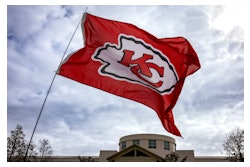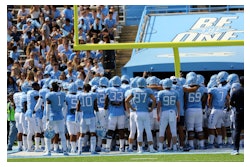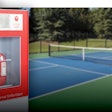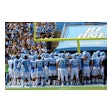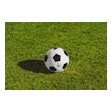As some homeschoolers continue their fight to participate in interscholastic athletics, others are forming their own teams and slowly building winning programs
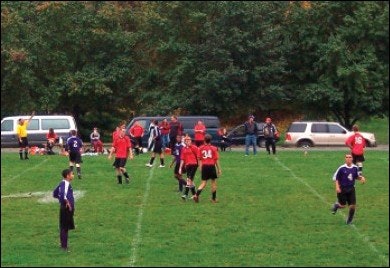
When Aaron Jones, a homeschooled seventh-grader in Mannington, W.Va., decided he wanted to wrestle for a local public middle school in 2002, officials turned him away on the grounds that Jones was not an enrolled student. So his parents did what many parents who homeschool their children do in that situation: They sued the state, arguing that their son had a constitutional right to wrestle at a school he did not attend.
But rather than follow precedent set in similar cases, Kanawha County Circuit Judge Duke Bloom in September 2003 ruled in the family's favor, citing violation of state law and the constitution. In the process, Bloom wiped out years of court decisions that have deemed participation in interscholastic athletics to be a privilege, not a right.
Now the West Virginia Secondary School Activities Commission, which had previously invoked an "enrollment and team membership" rule requiring student-athletes to be full-time students at the school their team represents, must comply with Bloom's ruling - at least until the state Supreme Court hears the case on appeal, probably sometime next year.
"There are a lot of far-reaching implications with this case," says Mike Hayden, executive director of the WVSSAC. "It doesn't affect just homeschoolers. We're talking about students in private schools that don't have certain activities being permitted to go to public schools for those activities while remaining a student at his or her private school."
The number of children educated in their homes, while still a small percentage of the nation's entire school-age population, is steadily climbing and has jumped nearly 30 percent since 1999. Estimates in 2003 ranged from 1.1 million (by the U.S. Department of Education) to 2.1 million (by the Salem, Ore.-based National Home Education Research Institute). Homeschool proponents contend that the huge disparity is due to survey methodology and semantics, but regardless of which figure is most accurate, it's safe to say that homeschooling is a trend that shows no sign of slowing down.
"It has gone from being almost extinct to involving well over one million kids," says NHERI President Brian Ray, who has observed the rise of homeschool programs for more than two decades. "Sociologically, nothing grows that fast."
Yet only 14 states (Arizona, Colorado, Florida, Idaho, Iowa, Maine, Michigan, Minnesota, New Hampshire, North Dakota, Oregon, Utah, Vermont and Washington) have enacted legislation designed specifically to allow homeschooled children to participate in interscholastic sports or other extracurricular activities. Most homeschooled students taking advantage of those laws are required to be legally registered under the state's homeschool law, meet the same academic-eligibility requirements of an enrolled student and submit test scores or periodic academic reports to the school in question.
Among the other states, some state high school associations deny homeschoolers access to interscholastic teams, others permit homeschoolers to play under certain conditions (such as part-time enrollment) and still others let individual school districts decide each case. In situations in which a district refuses access and a homeschooler sues, the courts have almost always ruled in favor of the defendant (see "The Way Home," Sept., p. 20). Even though Bloom's decision in West Virginia runs counter to the trend, homeschoolers in many communities, deprived of the right to participate on local interscholastic sports teams, have begun playing for small private-school teams or fielding their own teams that compete against each other or private schools.
It's a "thorny issue," says Robert Gardner, chief operating officer of the National Federation of State High School Associations - not because of the number of homeschooled students who seek a place on public-school team rosters (which is estimated to be quite small), but because of the emotions involved in that quest. Some athletic directors, coaches, parents and players fear that an athletically talented homeschooled child will displace another worthy student-athlete who attends the school in question.
That's what happened last spring, when 14-year-old homeschooler Amber Chandronnait helped lead the Bow (N.H.) High School girls' tennis team to the 2004 Class M-S state championship. Chandronnait, who made it to the consolation finals of the United States Tennis Association's National Girls' 14 championships in May, displaced senior teammate Jessica Pepin, who had been Bow's top player the previous two years.
Gardner says scenarios similar to the one at Bow are rare. "None of our member schools have seen high numbers of homeschoolers participating in sports," he says. "And displacement hasn't been a factor."
Although most states require parents who homeschool their children to submit academic records to a school district or the state board of education before their children are allowed to participate, many administrators express concern about the potential for a tilted playing field. It's impossible to know if every child is being taught according to accepted standards, opponents say. After all, they ask, what's to prevent parents from padding their own kids' grades?
Of even greater contention in this era of bare-bones school budgets is the financial pressures homeschoolers put on public school districts. In the states that allow it, homeschooled students are able to take full advantage of public schools' athletic opportunities and other extracurricular programs, but the districts are prohibited from claiming those students when filing for federal per-pupil funding.
"If the public schools keep losing money, they're going to find a way to register homeschooled kids as full-time students," says Dave Horne, the father of three homeschooled children and coach of the Carolina Crusaders, the first homeschool football team in South Carolina - where the South Carolina High School League voted overwhelmingly in March to ban homeschoolers from interscholastic teams. "The schools will get their money, and the kids will get to play even though they won't have to attend the schools."
As many as 60 percent of all homeschooled children in kindergarten through 12th grade are involved in some type of sports activity at the interscholastic, municipal or independent level, Ray estimates. But the majority of them do not play high school sports. In fact, Gardner places the estimate at no more than five percent of all homeschoolers. Those who do play sports typically participate in lower-profile, primarily individual activities such as tennis, swimming, soccer and track. "I think if a homeschooler has the mental attitude of a football player, he wants to be in school," Hayden says. "He doesn't want to be homeschooled. We find that there are a lot of youngsters who are homeschooled, then get to the eighth or ninth grade and say to their parents, 'This is enough. I want to go to school.' "
Indeed, the number of homeschooled students goes down as the grade levels go up. Those who do remain homeschooled through their teen years, however, often need an outlet for competitive sports, says J. Michael Smith, president of the Purcellville, Va.-based Home School Legal Defense Association, a nonprofit advocacy organization that defends the constitutional rights of homeschooling families, although it doesn't encourage them to sue in order to gain access to high school sports. "Public schools say that they have an obligation to the kids going to a particular school. Well, those kids made a choice; they want to be involved in that public school. I don't think that should be the basis for depriving homeschoolers from participating in sports," Smith says. "But if you're homeschooled and you're resourceful enough, you can find some way to play pretty much anything you want - soccer, basketball, football, you name it - if you live in a fairly metropolitan area."
That's easier to do in some states than it is in others. In Colorado, for example, state law mandates that public schools allow any student enrolled in a home-based educational program to participate in any activity offered by a school district or a public school that is not otherwise available to that student. "We're basically the interpretive party for that," says Bert Bergmann, assistant commissioner of the Colorado High School Activities Association. "Therein lies the most difficult aspect of this, and that is the justification of our eligibility rules as they pertain to participation. The key is that the school, the homeschoolers and their parents understand that academic eligibility is required under state law. They need to meet the same standards met by the kids enrolled at the school at which they're going to participate, with the exception of attendance."
In many ways, states' disparate policies regarding homeschoolers' participation in interscholastic sports can be likened to the vast differences around the country regarding transfer-eligibility requirements. "It's absolutely similar," Borgmann says. "In both cases, people are looking for ways that will work best for individual districts or individual states. I don't think there's any perfect way to address these situations. The biggest challenge is when an outside group - whether it is a state legislature or somebody else - tries to get involved in the way you operate your business. In many cases, that group doesn't understand the breadth of the challenges it is creating."
In states where homeschooled student-athletes are required to take a minimum of one class at a public school, options can include a band or music credit, an Advanced Placement course or, most commonly, a physical-education requirement. (Local college and university recreation and fitness centers, health clubs, YMCAs and privately operated facilities also open their doors to homeschooled students for physical-education classes.)
"We tend to be pretty skeptical of those school-based programs," says Ian Slatter, director of media relations for HSLDA and its administrative arm, the National Center for Home Education. "We interpret that as the school trying to bring a homeschooled child into the public system. We definitely prefer to remain apart from that public system and its government controls."
That desire to remain free of government-imposed restrictions also explains why HSLDA suggests homeschoolers form their own teams or join teams at small Christian or other private schools rather than attempt to infiltrate the student-athlete ranks at public schools. (In states with lenient extracurricular participation rules, homeschoolers may not be permitted to form their own teams.)
"The investment involved in starting sports programs - the facilities themselves are beyond the scope of most homeschool families - makes it difficult to set something up ourselves," Slatter admits. "But once facility-usage issues have been ironed out, homeschoolers could have comparable sports leagues. They're never going to be as large as those at the public schools, obviously. But if homeschooling continues to grow, these programs could become similar to ones at small suburban school districts."
Considering the position many homeschooling families take regarding public schools and their desire for academic freedom, Slatter's vision doesn't seem too far-fetched. In fact, opting for similar athletic freedom seems to be the most logical choice - from both a practical and a legal perspective.
Already, countless homechoolers around the country have formed their own teams to compete against each other and existing municipal-recreation teams, or more commonly, against small private schools and even public schools. Players usually come from several different communities and practice during non-peak hours at municipal or privately operated facilities.
State and regional tournaments (especially in basketball) take place across the country, and there are at least two organizations that sponsor national basketball tournaments for homeschool teams. The National Christian Homeschool Basketball Championship & Family Conference drew 240 teams from 25 states to Oklahoma City last March, while the National Christian Homeschool Athletic Association hosted 48 teams in Wichita, Kan., last spring. The NCHAA also sponsors national soccer, track and volleyball tournaments, and the Tomball, Texas-based Homeschool World Series Association operates annual baseball and softball championships. In addition, six-, eight- and 11-man football teams and leagues are cropping up around the country.
"Imagine walking off the street into a gymnasium," says Chris Davis, president of Linden, Va.-based Home School SportsNet Inc., a web site (hspn.net) that promotes homeschool athletic programs throughout the country. "You see two teams that have uniforms, there are refs, a scoreboard, a crowd. They look like two high school teams playing basketball, when, in fact, one of them is a team of homeschoolers. This is where we're heading."
A successful example of what Davis is talking about can be found in the Family Educators Alliance of South Texas, a nonprofit information clearinghouse and support-services provider for homeschool families. Based in San Antonio, FEAST began sponsoring basketball programs in 1990, one year after the organization was founded. Today, in addition to basketball, the alliance sponsors baseball, cross country, soccer, softball, tennis, track and volleyball, with six-man football slated to begin next fall. While some of these programs include only varsity and junior varsity teams, others such as basketball boast multiple teams of various skill levels.
FEAST's headquarters, rather ironically, are located inside a converted high school that features two full-size basketball courts and one outdoor soccer field. It's a huge improvement over the parking-lot practice courts and rented gymnasiums the organization frequented during its early years. As facilities have improved, so have FEAST's teams, known collectively as the Patriots. After starting out playing teams from area churches and small private high schools, some Patriots teams moved on to compete against midsize private schools, then large private schools, then small public schools. They now compete against some of the largest public schools in the San Antonio area and beyond, sometimes traveling up to four hours, one way, to play a game.
"As we've grown, we've developed a reputation, and our competition level is on par with the 5A public school powerhouses in Texas," says Mikki Frias, FEAST's athletic coordinator. "Our varsity basketball teams can no longer play the smaller schools, because we're beating them by 30 or 40 points. So I schedule my JV to play varsity games. That's permissible if the other schools agree. Sometimes an athletic director will even ask us to send our JV team to play his varsity team. Who wants to be beaten by a bunch of homeschoolers?"
Despite its success, FEAST was denied acceptance as a member of the Texas Association of Private and Parochial Schools because of its refusal to require parents to submit academic records to the association. Logistically, Frias says, doing so would be a nightmare. TAPPS has now created a separate division for homeschool teams that want to comply with its rules. "We are opposed to the division, because if we are part of a homeschool district, that means that we would only play other homeschool teams," Frias says, adding that FEAST has given up on its attempts to become a member of the association.
Horne, on the other hand, doesn't mind competing against other homeschool teams. In fact, he's thrilled that his players have the opportunity to play football at all - even if it's only eight-man games. His Rock Hill-based Crusaders are the only players from South Carolina in the state to participate in the five-year-old North Carolina-based Pioneer Football League, which consists of six teams ranging from 18 players (the first-year Crusaders) to 52 players (the South Charlotte Pride). His team finished its inaugural season with a 2-5 record.
A veteran youth sports coach, Horne is free to recruit players from area homeschool programs, and he hopes to grow the team by five or more players every year. "Because there are so many homeschool groups around, just finding out where they are and if they have boys who are potential football players is quite a job," he says.
Homeschoolers in Florida actually have the option of choosing where they want to play football - or any other sport. While the Florida Legislature allows them to participate on interscholastic teams, the Florida High School Activities Association also recognizes the Home Educators Activities Teams, an organization of homeschool students and parents with multiple branches throughout the state that provides outlets for extracurricular activities.
"As far as the state association is concerned, we're a school," says Dan Malay, executive director of Broward County's new South Florida HEAT program, which is expected to begin competition this spring against private schools in track, indoor soccer, intramural golf and possibly baseball and softball. He expects about 90 or so of Broward County's approximately 2,000 homeschoolers to participate in the programs and compete against private schools in the area. Plans call for adding volleyball and boys' golf in the fall, with boys' and girls' basketball and coed soccer to follow next winter.
"The homeschool community is unique, because its members are very guarded in terms of what they're going to involve their kids in. They want to wait and see, and that's what is happening," Malay says, adding that participation fees will likely be about $300 per sport. "The challenge for us has been converting the interest and excitement surrounding these programs into people rolling up their sleeves and taking out their checkbooks."
HEAT teams will consist of homeschoolers in grades six to 12, but Malay hopes to develop teams from the lower age levels first, giving current high school-age homeschoolers the option to compete for HEAT or to continue on interscholastic teams.
It's worth noting that Malay is also the assistant athletic director at Calvary Christian Academy in Fort Lauderdale and does not homeschool his children. A few homeschoolers do participate in sports at Calvary Christian, but must pay higher fees to help the academy maintain its programs. "I see the value of homeschooling," Malay says. "I see the kids coming out of homeschools and they're just tremendous in terms of their academic and athletic levels. There is a sizable need in Broward County to provide athletics for them, so I was excited to help out."
The enthusiasm and success of such organizations as HEAT, FEAST and the Pioneer League lend credence to the argument that homeschoolers are fostering healthy competition not only among themselves but also with area public and private schools. "The ultimate, for me, is going to be bona fide homeschool championships with districts and regions and rivalries," Davis says. "We sort of have that now, but it's not the same feeling I had when I went to high school. I'd love for homeschooled kids to have that."
As homeschoolers continue to gain footholds in various communities, colleges and universities are recognizing that segment of the student population, too. In spring 2004, the NCAA streamlined its registration process for homeschoolers by eliminating a waiver process that previously identified them as non-high school graduates.
"Colleges and universities are learning that they have to treat people the same and not put up roadblocks for kids who come from a homeschool background," Ray says. "I think when they do that, they're going to get more people from homeschooling backgrounds who are interested in continuing to play sports."
Initially, homeschoolers were prohibited from the NCAA, which considered them dropouts. HSLDA responded by helping the NCAA create the waiver process, which permitted homeschoolers to submit required documentation. Over the past several years, a few notable homeschoolers have gone on to enjoy high-profile athletic careers. Most notable is Jason Taylor, who played football for Woodland Hills High School in Pittsburgh (Pennsylvania statutes allow homeschoolers to participate in interscholastic athletics), went on to earn a football scholarship at the University of Akron and is currently an All-Pro defensive end for the Miami Dolphins.
While supporters of homeschool-sponsored athletic programs may envision a time when homeschool leagues will become important enough that college recruiters place a value on attending their games, it's still a struggle for student-athletes on homeschool teams to grab the attention of recruiters.
"I know that there are a lot of kids who would not be in public schools if that were not the only way for them to play sports," says Horne, whose 17-year-old son is one of the Carolina Crusaders' "stars" and would probably be making a name for himself on a local high school team. "It's a tough situation, because I know my boy would be starting at York Comprehensive High - there's no question about it. He's not going to be seen as much, and his chances of getting recruited by a large university aren't good. But we've told him that if he's meant to play he will. That may mean walking on at a Division II or III school, although we had one player from the league last year who walked on at North Carolina State this season. Just having the chance to keep playing is sometimes good enough."














